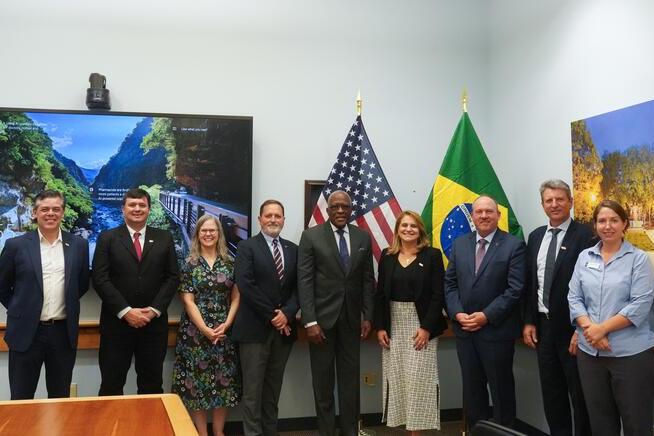ACES hosts Embrapa to advance cooperation between Brazil and Illinois

To advance collaborations and cooperation between Brazil and the University of Illinois Urbana-Champaign, the College of Agricultural, Consumer and Environmental Sciences (ACES) hosted a distinguished delegation from the Brazilian Agricultural Research Corporation (Embrapa), including its president, on Sept. 16.
Embrapa was established by Brazil’s federal government in 1973 to develop the technological foundation for a genuinely tropical model of agriculture and animal farming. The initiative has been tasked with providing Brazil with food security and a leading position in the international market for food, fiber and energy.
While on campus, the Embrapa delegation met with senior university leadership including Chancellor Robert Jones, College of ACES Dean Germán Bollero, ACES Interim Associate Dean of International Programs Mary Arends-Kuenning, ACES Associate Dean for Research Rodney Johnson, select faculty and staff who have research interests in Brazil, and the Center for Digital Agriculture.
The program, organized by the Office of International Programs, served to build community between the two institutions and countries so they can work together to meet global challenges. Specifically, this visit paves the way for an upcoming Bilateral Joint Call for Proposals between the College of ACES and Embrapa that will fund collaborative projects by showcasing the existing work and expertise on both sides.
Chancellor Jones remarked that agriculture and computer science are closely linked at Illinois, with our undergraduate CS+CPSC program being one of the first of its kind in the country.
Providing context of the U. of I.’s long and significant history with Brazil, Arends-Kuenning noted to the attendees, “Embrapa adapted soybean seeds to Brazil's subtropical climate and soils. As a result, Brazil became a leading global producer. Many Brazilian agronomists have been trained at Illinois.”
Arends-Kuenning continued, "Embrapa is considered a jewel of the Brazilian public sector based on its far reach and its impact. We are honored to partner with them.”
Additionally as part of the visit, the first female president of Embrapa, Dr. Silvia Massruhá, presented a public lecture, “The future of agriculture and food begins now: Embrapa’s vision” that was well attended by members of the wider U. of I. community.
Massruhá noted the initiative has more than 1000 projects and 4000 technological assets with representation in 40 countries around the world. “We have shown a $4.25 return for every dollar invested in our programs,” she said. Some of the most pressing initiatives she mentioned included reducing greenhouse gasses, a national conversion program for pastures, zoning for climate risk, and improving the self-sufficiency of tropical wheat with a low carbon footprint.
Additional Embrapa representatives included Clenio Nailto Pillon, Executive Director of Research and Innovation; Marcelo Augusto Boechat Morandi, Head of International Office; and Alexandre Costa Varella, Labex Coordinator and representative in North America.
“In the coming months our office will host Zoom ‘matching’ meetings so that researchers on both sides can meet and see if they are interested in developing a joint proposal. This week’s meetings were a chance to familiarize the Embrapa leadership with our faculty’s work so they can encourage their researchers with similar interests to attend the matching meetings over the winter months,” said Lauren Karplus, assistant director of ACES International Programs.